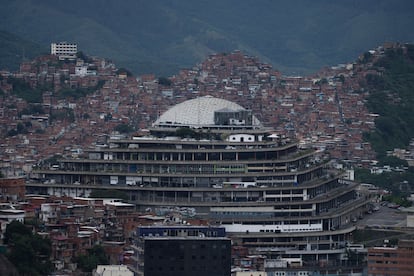Nicolás Maduro says the notorious El Helicoide prison is ‘a moral compass’
The Venezuelan president was given a scale model of a jail that doubles as the headquarters of the Bolivarian Intelligence Service as a gift during a police promotion ceremony

Venezuelan President Nicolás Maduro just received a gift: a scale model of El Helicoide, the headquarters of the nation’s Bolivarian Intelligence Service (SEBIN). It also serves as a prison notorious for its overcrowded and appalling conditions, where political opponents are held. According to the United Nations, there have been serious human rights violations in the prison. The gift was presented at a televised police officer promotion event. Maduro accepted the gift from a group of uniformed officers and said, “It [the prison] is a moral compass. I appreciate this deeply significant model of your headquarters and workplace. I accept it with much love.”
Currently, there are approximately 290 political prisoners in El Helicoide, including journalist Roland Carreño, a Voluntad Popular party member and close associate of Leopoldo López, the exiled opposition leader who has been charged with insurrection and treason.
During the early 2000s, El Helicoide held just a handful of political prisoners, primarily police officers and military personnel who opposed Hugo Chávez’s government from its inception. They were incarcerated in tiny six-by-six-foot cells, and some prisoners are still held in these dungeons. The prison has circular hallways that create an unsettling atmosphere, and the dark, isolated visitation room has been the scene of frequent mistreatment of family members. In the distance, the shantytowns on the hills of San Agustín provide a rare visual distraction.
The country’s social and economic decline, along with a worsening political crisis, has led to greater political repression and El Helicoide began to fill up. By 2014, the prison was excessively crowded, with cells cramming up to 12 prisoners. Rat and cockroach populations surged, while fundamental necessities like sanitary facilities and running water were desperately scarce. Instances of abuse became widespread. The harsh prison conditions were documented by the United Nations High Commissioner for Human Rights, as well as by the Inter-American Commission on Human Rights.
Most of the prisoners at El Helicoide are political and civil activists from the opposition, including leaders like Freddy Guevara, Juan Requessens, Jon Goicoechea, and Manuel Rosales. However, the prison also holds drug traffickers like Walid Makled, businesspeople, bankers accused of fraud, hitmen with connections to the regime, and dissident police officers and military personnel. The prisoner count reached 900 and started decreasing gradually around 2020, as part of political negotiations and a relaxation by Maduro’s government.
El Helicoide was planned in the 1950s as an ambitious shopping center under General Marcos Pérez Jiménez. However, when the dictator was overthrown in January 1958, construction abruptly stopped. Years of anti-Pérez Jiménez sentiment pushed the project into oblivion for decades. Consequently, the urban area surrounding El Helicoide, nestled between San Agustín and Roca Tarpeya, deteriorated gradually into poverty.
Delsa Solórzano, an opposition candidate with the Encuentro Ciudadano party, expressed her indignation at the presentation of the Helicoide model and said, “It’s yet another symbol of the repression and crimes against humanity that have been committed in Venezuela.”
Sign up for our weekly newsletter to get more English-language news coverage from EL PAÍS USA Edition
Tu suscripción se está usando en otro dispositivo
¿Quieres añadir otro usuario a tu suscripción?
Si continúas leyendo en este dispositivo, no se podrá leer en el otro.
FlechaTu suscripción se está usando en otro dispositivo y solo puedes acceder a EL PAÍS desde un dispositivo a la vez.
Si quieres compartir tu cuenta, cambia tu suscripción a la modalidad Premium, así podrás añadir otro usuario. Cada uno accederá con su propia cuenta de email, lo que os permitirá personalizar vuestra experiencia en EL PAÍS.
¿Tienes una suscripción de empresa? Accede aquí para contratar más cuentas.
En el caso de no saber quién está usando tu cuenta, te recomendamos cambiar tu contraseña aquí.
Si decides continuar compartiendo tu cuenta, este mensaje se mostrará en tu dispositivo y en el de la otra persona que está usando tu cuenta de forma indefinida, afectando a tu experiencia de lectura. Puedes consultar aquí los términos y condiciones de la suscripción digital.








































